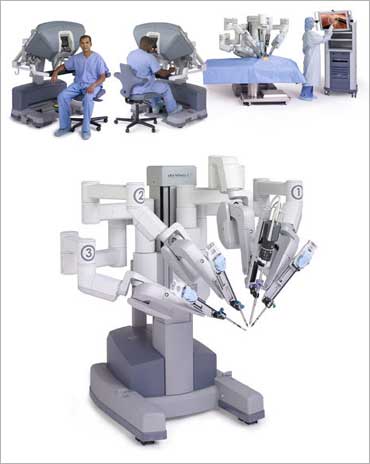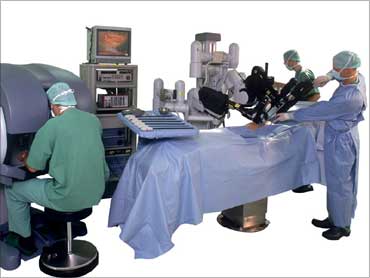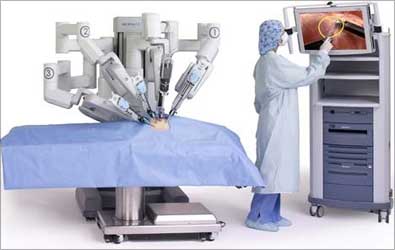
Kidney patients have a reason to cheer as Nadiad - a sleepy town lying between Ahmedabad and Vadodara, would soon have a robot conducting urology surgeries on them that will not only have superfine precision, but will also less than halve the post operation recovery time.
A non-profit 170-bed charitable hospital run by the Muljibhai Patel Society for Research in Nephro-Urology, the Muljibhai Patel Urological Hospital, popularly known as Nadiad Kidney Hospital, is planning to buy the Rs 10 crore (Rs 100 million) da Vinci robot, a four-armed US made model for intricate prostate and kidney surgeries.
"We have always tried to adopt new technology, and would not like to deprive our patients of the new-age surgical experience that definitely comes with numerous advantages," said Mahesh Desai, managing trustee and chairman, department of urology at the Nadiad Kidney Hospital.
So, what are the advantages?
As Desai points out: "In a computer assisted surgery, a doctor can sit at a remote place and conduct live surgery. Only recently, a doctor in New York did a surgery on a patient in Paris. In a hospital set up, an experienced doctor can preside over two or three simultaneous operations from his chamber while young doctors could man the operation table together with the robot." ...

On top of it, while it takes around two months to recover from an open surgery, a patient will up on his feet in 10 days after a robotic surgery as the scars and incisions are restricted to minimal extents.
However, he will have to shell out around 25 times more for a robotic surgery that can cost around Rs 500,000 per surgery.
Nadiad Kideny hospital is planning to extend the services of the robot to other surgical fields apart from urology, like paediatrics, gynaecology and oncology to make the service cost-effective.
"We already conduct uro-oncological paediatric urological surgeries, we can now think of offering the service to some gynaecological clinics, or can start a uro-gynaeocology department ourselves", Desai said.
He also pointed out that by 2012, similar systems on the lines of the da Vinci surgical systems would be open for other equipment makers to manufacture as the system goes off-patent. Intuitive Surgical has the monopoly over da Vinci robots now.

When asked, if the hospital would consider waiting till the robotic surgery set up was available at more competitive prices, Desai said that they wanted to acquire it much sooner than 2012.
"We will take up this issue at the next budgetary meeting. The management or promoters are likely to make the capital expenditure while the cost of running and maintaining the system will lie with the hospital", he explained.
Being a charitable hospital, around 68 per cent of all operative cases at the Muljibhai Patel Urological Hospital are free or subsidised, the remaining are either paid or partly paid cases.
While the cost of acquiring the system is around Rs 10 crore which comes with the basic machine and around 100 robotic arms, one has to later on incur a recurring cost of replenishing the robotic arms that come for $6000 each and last 10 operations.
The hospital is considering attracting patients from neighbouring states who will pay for availing the technology that will not only ensure 100 per cent accuracy and precision but also reduce recovery time.
This could take care of the recurring cost of maintenance that runs into Rs10-12 lakh (Rs 1-1.2 million) per annum and the service could come free for the needy patients.

MPUH had organised a live transmission of a surgery from the USC Institute of Urology, US at the hospital auditorium recently for 70 people and is upbeat on training personnel to equip them for conducting such surgeries.
Nadiad Kidney hospital was one of the five international locations along with Venezuela, UK, China and Kuwait which saw a live demonstration of the da Vinci Robot at work.
Robotic surgeries, particularly in urology and gynecologic-oncology, are increasingly being promoted as the new standard of care.
Hospitals are marketing it, patients are asking for it, and young physicians are expecting to be trained on it.
The number of da Vinci robotic surgical systems installed worldwide has ballooned from 210 in 2003 to 1,395 last year, with 1,028 of those in the United States, according to records from Intuitive Surgical, which makes the da Vinci robot.
In India only the All India Institute of Medical Sciences owns a da Vinci robot.